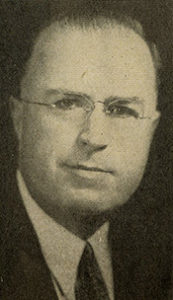From the Historian – Fall 2016
PSI ALUMNI HISTORIAN’S REPORT
Fall 2016
By T. Semmes Favrot
Below is a continuation of our Historian’s Report from the Fall 2016 Sighs of Psi, which is continued here due to space limitations in our newsletter.
DKE pin acquired- Brother Samuel Francis Hobbs, Psi 1908

Hobbs, Psi 1908. Photo courtesy of Collection of the U.S. House of Representatives; http://bioguide.congress.gov.
For a long time now, we have been trying, without success, to acquire vintage DKE pins belonging to some of the distinguished past members of our chapter. That has changed with the recent acquisition of the DKE pin of Brother Samuel Francis Hobbs, 1908. An attorney, judge and Congressman, Brother Hobbs had a distinguished legal career, and represented Alabama in the U.S. House of Representatives for eight consecutive terms, from 1935-1951. He is principally remembered today as the author of the Hobbs Act, a Federal criminal statute enacted to combat racketeering in labor-management disputes. It is still frequently used today in federal prosecutions in cases involving public corruption, commercial disputes, and corruption directed at members of labor unions.
Born in Selma, Ala., October 5, 1887, Hobbs was first educated at local public schools, Callaway’s Preparatory School in Selma, Marion Military Institute, and Vanderbilt, which he attended from 1905-1906. He then transferred to Alabama, and graduated from the law department of the University in 1908. He initially pledged DKE and was initiated as a member of the Gamma Vanderbilt DKE chapter, before transferring to Alabama and affiliating with Psi, so we share his legacy with the now-inactive Gamma Vanderbilt chapter.[1] However, his recently acquired DKE pin is marked with the Greek letter “Psi,” and the year 1908; thus, we are clearly entitled to consider him one of our own.
Hobbs was admitted to the Alabama bar in 1908 and commenced practice in Selma until 1921, served as Judge of the Alabama Fourth Judicial Circuit from 1921-1926, and held other appointed political positions before being elected to represent Alabama’s Fourth Congressional District in the Seventy-fourth and the seven succeeding Congresses (January 3, 1935-January 3, 1951). He was the lead manager appointed by the House of Representatives in 1936 to conduct impeachment proceedings against Federal Judge Halsted L. Ritter, which resulted in Ritter’s removal from office on corruption charges.
Throughout his congressional service, Hobbs was closely allied with F.B.I. Director J. Edgar Hoover. Hobbs was advised by Hoover aide Alexander Holtzoff, who called himself “Hobbs’s brain trust.” In 1941, at the behest of Hoover, Hobbs introduced a controversial bill that would have legalized wiretapping by the F.B.I., or any other government agency, if it was suspected that a felony was occurring. The bill was supported by the U. S. Attorney General, and seemed likely to pass, until Federal Communications Commission chairman Larry Fly testified against the bill to Congress, and it did not pass. The conflict over the bill was much discussed in the national news.
Hobbs also served as chairman of the Muscle Shoals Commission in the early 1930’s, and is credited as the lead author of a book entitled Muscle Shoals: A Plan for the Use of the United States Properties on the Tennessee River by Private Industry for “the Manufacture of Fertilizers and Other Useful Products.” We have a copy of this masterpiece of a DKE contribution to the literary arts in the Psi archives, so if anyone wants to read it, please let me know and I’ll send it. I tried to read it and have to confess to being unable to get past page two, but we don’t doubt its importance nonetheless. Please feel free to insert your own joke here about a DKE writing a book on the manufacture of fertilizer.
Hobbs did not seek re-nomination to his Congressional seat in 1950. He returned to Selma and reestablished his law practice, and died there on May 31, 1952. He is buried in Selma’s Live Oak Cemetery (see photo).[2] He had two sons who were Dekes at the Beta North Carolina chapter. One of them, Samuel E. Hobbs, also got a law degree at Alabama and served on the Board of Trustees of the University for 23 years, serving as Chairman of the board from 1981-1984. In 1989, he was called upon to serve for a time as interim chancellor of the University system.[3]
We intend to display Brother Hobbs’ pin in a place of honor in the DKE House. If anyone has DKE pins belonging to other Dekes of yore and would care to see them similarly displayed, we would be glad to give them a place of honor as well, along with a few lines in this column dedicated to such dearly departed Brothers.
In the Bonds,
Semmes Favrot ‘82
New Orleans, La.
Alumni Historian
[email protected]

Tombstone of Brother Samuel Francis Hobbs, Psi 1908 in Live Oak Cemetery, Selma, Alabama. Photo courtesy of Rennis Howard, findagrave.com.
[1] See his biographical entries under both Psi and Gamma in the DKE Catalogues of 1918 and 1926. The 1926 DKE Catalogue erroneously lists Hobbs as a member of the Class of 1909, rather than 1908.
[2] Much of the above biographical information on Hobbs was obtained from the Biographical Directory of the United States Congress: (http://bioguide.congress.gov/scripts/biodisplay.pl?index=H000663); also, Alabama Authors (http://www.lib.ua.edu/Alabama_Authors/?p=1487); and Wikipedia’s entry on Hobbs. (https://en.wikipedia.org/wiki/Sam_Hobbs).
[3] DKE Alumni Directory, 1985; 1994 Tribute To Samuel Earle Hobbs in the Congressional Record (http://thomas.loc.gov/cgi-bin/query/z?r103:S22FE4-447:)